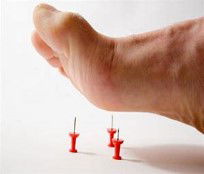Diabetic foot care

Diabetic foot care - People with diabetes are more likely to develop problems with your feet – problems that could end up as amputations. But most amputations can be prevented – four out of five in fact. If you take good care of your feet and check them regularly, you can reduce your risk of developing foot problems. It's a good idea to have your feet checked at least annually by a podiatrist and mention anything you might have spotted with him yourself. But don’t wait a whole year to ask, if you notice a problem – get advice as soon as you can.
Check your feet every day, because of your diabetes, foot problems can get worse quickly, the following guidance on what signs to look out for when you check your feet. Whether you’re about to put your socks on, or you’re taking them off before bed, have a good look. Any changes, and you should see a healthcare professional straight away.
Be careful if you lose sensation, if you’ve lost any sensation in your feet, you need to look out for them a bit more. Things like walking barefoot or sitting too close to radiators or heaters are risky.Try to be careful, you might not notice straight away if you hurt yourself. Watch out cutting your nails, cutting your nails seems simple but if you have diabetes, piercing the skin by mistake can lead to other injuries. And you might not even notice you’ve done it. When you cut your toenails it’s:
- good to cut them often but not too short or down the side
- safest to trim them with nail clippers and then use an emery board to file any corners
- best to clean them gently with a nail brush. Don’t use the sharp points of scissors to clean as this isn’t safe.
Washing daily is also a simple way to keep your feet and toenails clean and away from infection. Just a simple mix of soap and warm water will do, but always check the temperature before you put your feet in. Careful not to soak your feet as this just makes the skin soggy and more likely to get damaged. If you’ve lost some sensation in your feet or you’re worried about things like ingrown toenails, please discuss with your podiatrist.
Make sure your footwear fits, if your shoes or socks are too tight, too loose or rub, then don’t wear them. The right shoes and stockings, tights or socks will help keep your feet healthy. Shoes that don’t fit well, even those that feel comfortable, can cause all sorts of problems. As can things like old innersoles, or socks with holes or thick seams. It’s good to buy shoes that:
- are broad fitting
- have a deep and rounded toe area
- are flat or low heeled
- are fastened by a lace or buckle to stop your feet sliding around.
If you’re unsure of the fit or style that is best for you, then ask.
Finally, Diabetes UK produce a range of books, pamphlets and advice for diabetics, their website is www.diabetes.org.uk


